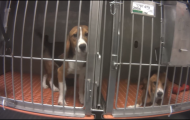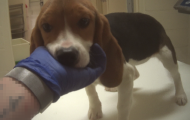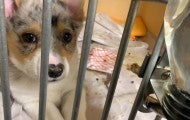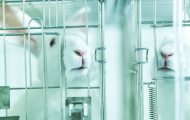Artificial intelligence, organ-on-chip technology and 3D bioprinting: These advancements promise to dramatically reshape our world, and they’ll play a part in making animal experiments obsolete. Sophisticated testing and research methods that use human cells or human biology-based technology will one day completely replace experiments on animals—a game-changer not just for animals, but for human health. The only question is how quickly it will happen.
The hurt and harm of animal testing can extend beyond what happens in laboratories, as a new scandal concerning one major animal testing company’s acquisition of monkeys shows. The U.S. Securities and Exchange Commission is investigating whether Inotiv and several of its subsidiaries violated the U...
For years our undercover investigations at U.S. animal research laboratories have helped to raise awareness about the immense animal suffering caused by animal testing and experimentation. Pregnant rabbits are force-fed toxic pesticides. Cats have their spinal cords damaged and are forced to run on...
Imagine having to work in a roadside zoo, a pet store selling puppy mill puppies, a slaughter plant or a factory farm without ever being able to show your true feelings. Would you ever be able to walk alone among hundreds of dead animals at a wildlife killing contest, surrounded by people carrying...
The movement to end the testing of personal care and beauty products on animals has gained unprecedented momentum in recent years, with three U.S. states, 39 countries, and more than a thousand manufacturers abandoning this outdated and unnecessary practice. Today, Congress took an important step...
You may have seen in the news that our Animal Rescue Team was approached by the U.S. Department of Justice to remove roughly 4,000 beagles from a breeding facility that supplied laboratories that test on animals. We are honored to have been chosen to lead this historic effort and to coordinate the...
Maryland will soon become the fifth U.S. state to say no to cosmetics testing on animals. State lawmakers last night voted to prohibit new tests on animals for cosmetics and all sales of newly-animal-tested cosmetics beginning July 2022. The Senate and House versions of the bills passed the Maryland...
China has, for a long time, been on the sidelines of the global campaign to end animal testing for cosmetics. Animal tests have, in fact, been a legal requirement for many types of cosmetics made and imported into China, and authorities have traditionally required pre-market animal testing before...
By Kitty Block and Sara Amundson The United States has moved one step closer to ending unnecessary cosmetics testing on animals, as Illinois becomes the third U.S. state to enact a marketing ban preventing companies from selling cosmetics that have newly been tested on animals. On August 9, Governor...
In a victory for rabbits, guinea pigs, mice, rats and all animals used for testing, Louisiana is the latest state to take steps to end the cruel and unnecessary use of animals to test cosmetics. Eight other states ( California, Nevada, Illinois, Virginia, Maryland, Maine, Hawaii and New Jersey) have...
Last week, Washington became the 12th U.S. state to pass a law to ban the sale of cosmetics newly tested on animals. This is a win for all the guinea pigs, rabbits, mice and rats who will never have to suffer through painful testing, including having cosmetics chemicals forced down their throats, dripped into their eyes or smeared onto their skin. If the animals don’t die during the experiments, they are typically killed by asphyxiation, neck-breaking or decapitation without any pain relief.
Even in our age of advanced technologies, rabbits, guinea pigs, mice and rats continue to have chemicals and substances forced down their throats, dripped into their eyes or slathered on their skin to satisfy new regulatory demands that undercut progress against cosmetic animal testing. That’s why...
Back in the 1940s, when government scientists were asked to check cosmetics for safety, they turned to rabbits. Dr. J.H. Draize and colleagues at the Food and Drug Administration dropped chemicals into the animals’ eyes and applied them to their skin, then assigned scores to the redness, swelling...
A Manhattan Supreme Court judge has imposed a remarkable $3.9 million in fines on the now-closed Chelsea Kennel Club and its former owner, found liable for pushing sick puppies upon an unsuspecting public, and ordered them to set up a restitution fund for the consumers the pet store betrayed. This...
The world is moving toward a future dominated by sophisticated methods that use human cells, tissues and organs, 3D printing, robotics, computer models and other technologies to create approaches to testing and research that do not rely on animals. These methods are often faster, less expensive and...


















